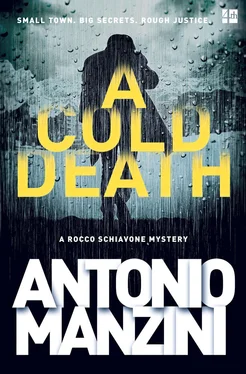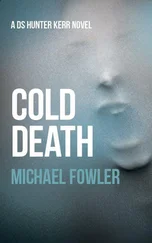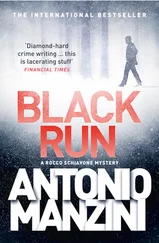But Rocco remained straight-faced, leaning against the wall, lost in thought. “Holy shit!” he said, between clenched teeth. “I’m an idiot! Why didn’t I think of it? What a shitty profession this is!” Cursing, he left the game room before the astonished eyes of the two pool players.
“Albe’, tell me that what I’m thinking doesn’t hold up!”
“Run it by me again, Rocco,” said the medical examiner, as he leaned over Signora Baudo’s corpse.
“When I walked in, I switched on the light. And it short-circuited. So that means it was turned off before, right?”
“Okay, Rocco, I’m with you.”
“Obviously, when she fell the poor woman yanked loose a couple of wires. When I flipped the switch I caused a short circuit. What does that mean? That she hanged herself in the dark. How did she do it? She lowered the blinds, fastened the noose, and let herself drop?”
“That doesn’t make any sense at all,” said Fumagalli, “and so?”
“So it must mean there was someone there with her. Whoever it was must have lowered the blinds after she hanged herself. Jesus fucking Christ!” Rocco cursed through clenched teeth.
“And listen,” Fumagalli said, “as long as you’re here, I have something else to point out. Look at this.” He pointed to the victim’s fair skin.
They walked over to the corpse, which Deruta and Rispoli had lowered to the parquet floor. “The cable is too thin to leave a bruise like that. You see it?” Alberto Fumagalli pointed to the purple stripe on Esther’s neck. It was a couple of finger widths wide. “When the cable dug into the flesh, it just left a narrow stripe; you see it? In other words, it wasn’t this cable that strangled her. That much is clear. And did you get a good look at her face?”
Rocco sank into the leather armchair in the den. “Of course. She was beaten up. Do you know what that means?”
Fumagalli said nothing.
The deputy police chief continued with a low rattle, from the chest, a distant sinister gurgle like a rumble of thunder, warning of an oncoming storm. “That means this isn’t a suicide. It means I’m going to have to deal with this thing, and it also means a series of pains in the ass unlike anything you can even imagine!”
Fumagalli nodded. “So now I’m going to take this poor creature to my autopsy room. And you’d probably better call the judge and the forensic squad.”
Rocco suddenly jumped out of his chair. His mood had shifted as quickly as a wind at high elevation suddenly bringing black rain-heavy storm clouds where minutes before the sun had been shining.
As he left the room Rocco glanced at Deruta and Caterina. “Rispoli, call the forensic squad in Turin. Deruta, go do what I told you and D’Intino to do this morning.”
“But we’re supposed to do the stakeouts at night,” the cop shot back.
“Then go get some rest, go make bread with your wife, just get the hell out of my hair!”
Like a kicked dog, Deruta shot out of the apartment. Caterina asked no questions. Unlike Officer Deruta, she had learned that when the deputy police chief’s mood turned sharply black, the best thing was to shut up and obey.
“Pierron!” Rocco shouted, and Italo’s face appeared immediately at the door to the living room.
“Yes, Dottore.”
“Scatter the people who are rubbernecking out in the street. I want the names of the Russian woman who was the first to enter the apartment and that half-dead warrant officer. Tell Casella to get busy and make sure nothing comes out in the newspapers. Question all the neighbors, and have someone call the district attorney’s office. This is another pain in the ass of the tenth degree, Rispoli, you understand?” And though he had used her name, he was no longer speaking to the unfortunate inspector who was busy talking on the phone to someone in Turin. Right now Rocco was talking to everyone and to no one, waving his hands as if he were perched on the edge of a cliff and trying desperately to regain his balance. “This is definitely a pain in the ass of the tenth degree, no doubt about it!”
Italo nodded, sharing his boss’s opinion wholeheartedly. In fact, he knew that the deputy police chief had cataloged the sources of annoyance or pains in the ass in life by degrees, or levels. From level six on up.
In Rocco’s own personal hierarchy of values, the sixth level of pains in the ass included children yelling in restaurants, children yelling at swimming pools, children yelling in stores, and just in general, children yelling. Then there were salespeople calling with special offers of convenient bundled contracts for water, gas, and cell phone, blankets that come untucked from under the mattress leaving your feet to freeze on winter nights, and the apericena —Italy’s latest trend in dining, a blend of aperitif and dinner. The seventh level of pain in the ass included restaurants with slow service, wine connoisseurs, and colleagues at the office with garlic on their breath from dinner the night before. The eighth level included shows that went longer than an hour and fifteen minutes, giving or receiving gifts, video poker machines, and the Roman Catholic radio station, Radio Maria. At the ninth level were wedding invitations, baptism invitations, First Communion invitations, or even just party invitations. Husbands complaining about wives, wives complaining about husbands. But the tenth level, the highest ranking of all possible pains in the ass, the very maximum degree of annoyance that life—that old bastard—could possibly stick him with to ruin his day and his week, towered high above the rest, unequaled: an unsolved case of murder. And Esther Baudo’s death had just turned into one, right before his eyes. Hence the sudden mood shift. For anyone who knew him, this was a mood swing to be expected; for anyone who didn’t, it was an overblown reaction. It was a case of homicide, and it sat there, useless and relentless, wordlessly demanding a solution that only he could provide, asking a mute question that he and no one else would have to answer. To get that answer he’d have to delve into a filthy well of horrors, plunge down into the abyss of human idiocy, scrabble around in the squalor of some diseased mind. At times like this, when a case had just blossomed like a flower of sickness among the underbrush of his life, in those very first few minutes, if Rocco had chanced to lay hands on the guilty party, he would have gladly and ruthlessly wiped him from the face of the earth.
He found himself sitting at the center of the living room. In the adjoining room, Alberto Fumagalli was working silently on the victim. The other officers had melted away like snow under bright sunlight, each to carry out specific instructions. He rubbed his face and got to his feet.
“All right, Rocco,” he said in an undertone, “let’s see what we have here.”
He pulled on the leather gloves he had in his pocket and ran his eye around the apartment. A chilly, impersonal eye.
The mess in the living room was, all things considered, the ordinary mess of everyday life. Magazines lay scattered, sofa cushions shoved aside, a low table across from the television set covered with clutter of all sorts—cigarette lighters, bills to pay, even two African carved wooden giraffes. What didn’t add up, on the other hand, was the unholy disarray in the kitchen. If there actually had been burglars in the apartment, what would they have been looking for in the kitchen? What valuables do people keep in the kitchen? The cabinet doors had all been thrown open. All except the doors under the sink. The deputy police chief pulled those doors open. There were three receptacles for sorted waste: garbage, metal, and paper. He peeked inside. The garbage was full; so was the bin for metal cans. But the container for paper and cardboard was almost empty. There was only an empty egg carton, a flyer for a trip to Medjugorje with a special offer on pots and pans, and a fancy black shopping bag with rope handles. At the center of the bag was a sort of heraldic crest. Laurel leaves surrounding a surname, “Tomei.” Rocco thought he remembered a shop by that name in the center of town. Inside the bag was a gift card. “Best wishes, Esther.”
Читать дальше












